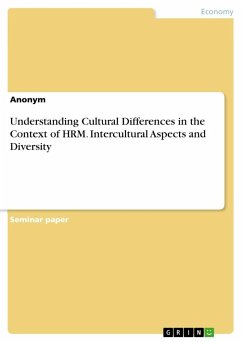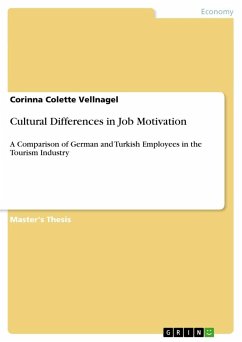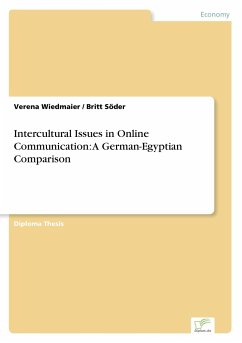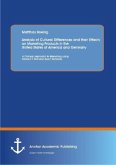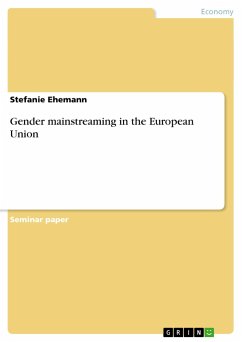Bachelor Thesis from the year 2005 in the subject Business economics - Personnel and Organisation, grade: 1,0, University of Applied Sciences Deggendorf (Studiengang Bachelor of International Management), language: English, abstract: Inhaltsangabe:Abstract:
In an ideal world, the policemen would be English, the car mechanics German, the cooks would be French, the bankers Swiss, and the lovers Italian. But in the real world, we must not forget that there are also policemen that are German, car mechanics that are French, cooks that are English, bankers that are Italian and lovers that are Swiss (wwwanalytictechcom).
Internationalisation and globalisation have an enormous affect on every day life. The number and intensity of contacts in business life, school, apprenticeship, advanced training or in private life between people from different cultures is ever-increasing.
Due to a growing number of international companies and mergers, working together with foreign colleagues has become a usual occurrence for many people. It is therefore a central topic of the 21st century to cope with cultural diversity and develop intercultural competence.
Looking back at history, interaction between cultures is nothing new. Interstate contacts and intercultural processes have always been the result of political, military, economic and religious actions. In the majority of cases, the enlargement and stabilisation of the power structure were the fundamental causes for these processes.
Due to an expanding transportation system and technological progress, globalisation has entered a new dimension. Nowadays, information can be passed on across the globe easily and inexpensively; exchanges between schools, universities or businesses have become a stable feature; travelling around the world is no longer the privilege of the rich.
Accordingly, there are several areas of life affected by cross-cultural interactions; a very complex one is the working environment, which is the subject of this thesis.
Understanding the dynamics of international business encounters requires a fundamental shift from comparative studies of cultural differences to the study of intercultural interactions. The decisive issue in international management is not the existence of differences, but the way behavioural differences are perceived, interpreted, and managed by members of different national cultures.
This research will clarify the intercultural aspects of business relations between French and Germans. Why is this relationship of such great interest?
As the European Union grows, the idea of a European identity is spread among its member countries. Although these countries have a relatively close geographical position towards each other, there are still cultural differences. In particular, the relationship between Germany and France shows that these differences persist and have even increased since the reunification of Germany in 1990.
Despite the establishment of numerous programs and institutions, with the aim of improving intercultural relations between these two countries, stereotypes and prejudices still exist on both sides of the Rhine. According to several publications and studies, everyday life as well as business life is equally affected by the inharmoniousness caused by these cultural differences. Frequently, business negotiations and even mergers between German and French companies fail due to intercultural misunderstandings and the problems involved.
The aim of this thesis is to illustrate intercultural conflict potential between French and Germans in business life and to establish a better understanding of the French culture.
Behaviour patterns are an expression of various influences over the centuries. In order to acquire intercultural competence of a country, it is important to know about its applied geography and the consistencies in its economy, histor...
In an ideal world, the policemen would be English, the car mechanics German, the cooks would be French, the bankers Swiss, and the lovers Italian. But in the real world, we must not forget that there are also policemen that are German, car mechanics that are French, cooks that are English, bankers that are Italian and lovers that are Swiss (wwwanalytictechcom).
Internationalisation and globalisation have an enormous affect on every day life. The number and intensity of contacts in business life, school, apprenticeship, advanced training or in private life between people from different cultures is ever-increasing.
Due to a growing number of international companies and mergers, working together with foreign colleagues has become a usual occurrence for many people. It is therefore a central topic of the 21st century to cope with cultural diversity and develop intercultural competence.
Looking back at history, interaction between cultures is nothing new. Interstate contacts and intercultural processes have always been the result of political, military, economic and religious actions. In the majority of cases, the enlargement and stabilisation of the power structure were the fundamental causes for these processes.
Due to an expanding transportation system and technological progress, globalisation has entered a new dimension. Nowadays, information can be passed on across the globe easily and inexpensively; exchanges between schools, universities or businesses have become a stable feature; travelling around the world is no longer the privilege of the rich.
Accordingly, there are several areas of life affected by cross-cultural interactions; a very complex one is the working environment, which is the subject of this thesis.
Understanding the dynamics of international business encounters requires a fundamental shift from comparative studies of cultural differences to the study of intercultural interactions. The decisive issue in international management is not the existence of differences, but the way behavioural differences are perceived, interpreted, and managed by members of different national cultures.
This research will clarify the intercultural aspects of business relations between French and Germans. Why is this relationship of such great interest?
As the European Union grows, the idea of a European identity is spread among its member countries. Although these countries have a relatively close geographical position towards each other, there are still cultural differences. In particular, the relationship between Germany and France shows that these differences persist and have even increased since the reunification of Germany in 1990.
Despite the establishment of numerous programs and institutions, with the aim of improving intercultural relations between these two countries, stereotypes and prejudices still exist on both sides of the Rhine. According to several publications and studies, everyday life as well as business life is equally affected by the inharmoniousness caused by these cultural differences. Frequently, business negotiations and even mergers between German and French companies fail due to intercultural misunderstandings and the problems involved.
The aim of this thesis is to illustrate intercultural conflict potential between French and Germans in business life and to establish a better understanding of the French culture.
Behaviour patterns are an expression of various influences over the centuries. In order to acquire intercultural competence of a country, it is important to know about its applied geography and the consistencies in its economy, histor...



